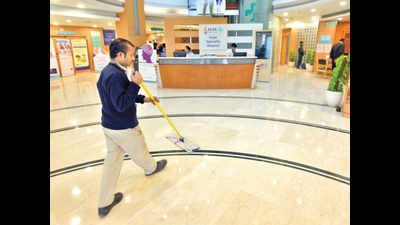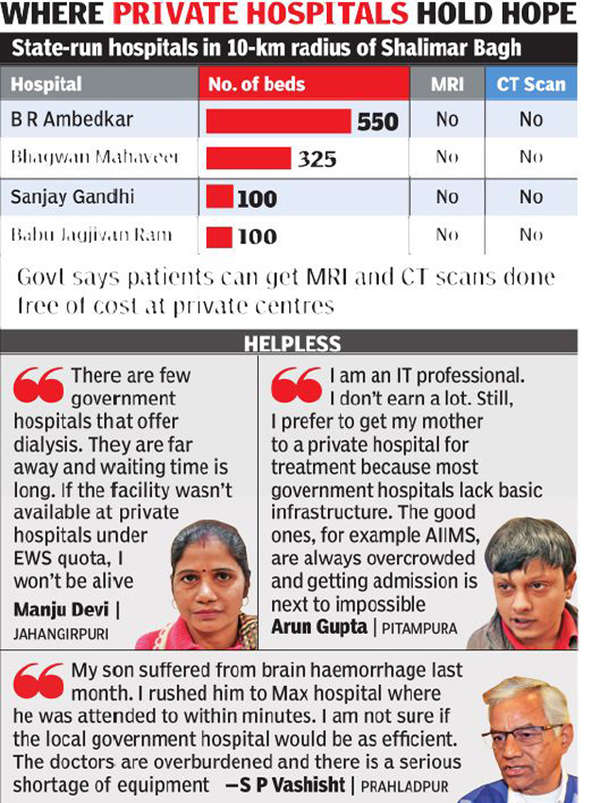- News
- City News
- delhi News
- Ill-equipped govt hospitals make private ones critical despite drain on savings
Trending
This story is from December 12, 2017
Ill-equipped govt hospitals make private ones critical despite drain on savings

Max Hospital Shalimar Bagh wears a deserted look after its licence was cancelled. (Photo: Piyal Bhattacharjee)
NEW DELHI: There are at least four big government hospitals within 10 km from Max Hospital, Shalimar Bagh, the hospital in the eye of a storm ever since a newborn was wrongly declared dead. Delhi government has cancelled its licence for medical negligence. These hospitals are: B R Ambedkar Hospital in Rohini, Bhagwan Mahavir Hospital in Pitampura, Sanjay Gandhi Memorial Hospital in Mangolpuri and Babu Jagjivan Ram Hospital in Jahangirpuri.
None of these has an MRI or CT scan facility, the key equipment for imaging in case of an orthopaedic or neuro-related trauma.In an emergency situation, say, for head injury sustained in a road traffic accident or a stroke, people say they have no option but to rush to the nearest private hospital, even if it is a drain on their savings.
B R Ambedkar is a 550-bedded hospital, which gets referrals from all state-run hospitals in the northwest district. Doctors there told TOI that they did not have an MRI or CT scan facility needed to see the extent of bone or soft tissue damage. “Even the ultrasound facility is not available 24X7,” said a senior doctor, who did not wish to be identified. Five of the 15 ICU beds in the hospital do not have monitors attached to ventilators to assess a patient’s vitals.

Asked about the lack of MRI and CT scan services, health minister Satyendar Jain said the government was providing the tests free of cost to people. “No one has to wait for the tests. The government has empanelled private centres where patients can get the tests done for free,” he said. However, doctors point out that in case of an emergency, transporting the patient to a facility outside leads to delay in diagnosis and treatment. “That is good only for routine and non-emergency cases,” said a doctor.
Many government hospitals also lack a C-arm, which is critical for safely operating on and fixing fractures, dislocations and other common trauma injuries involving the spine, hip bone or vertebra. C-arm is a machine that converts X-rays into a visible image. It helps a surgeon visualise a structure not otherwise visible or discernible in order to accurately place screws and other implants.
With its licence cancelled, Max Hospital, Shalimar Bagh, can’t run its OPD or admit new patients. However, the ones who are already admitted can seek referral or continue treatment. TOI spoke to families of the patients who now fear that the hospital may not be able to provide optimum service or follow-up after discharge.
At present, at least 112 patients are admitted here, and most relatives TOI spoke to said closing down the hospital was not a solution. “People are forced to go to private hospitals because of the poor condition of the government ones. Instead of shutting the former down, the government needs to regulate them and bring in stricter laws besides improving the state-run hospitals,” said Arun Gupta, an IT professional. He had come to the hospital to enquire about getting his father admitted for removing a tracheostomy tube. “The hospital told us it’s not possible,” Gupta said.
“We have not faced any problem so far. But we fear that doctors may stop coming because there is no work here. Also, how will we follow up after discharge,” Sanjay Chopra, a Shalimar Bagh resident whose wife is admitted at the hospital, asked.
Many patients, including those in the EWS category, go to Max for dialysis. “I used to get it done here twice a week for free under the EWS scheme. But the hospital says it cannot do it anymore,” complained Manju. There are only about 60 dialysis machines at three government hospitals. The Delhi government recently approved installation of nearly a hundred more such machines but that is still in process.
None of these has an MRI or CT scan facility, the key equipment for imaging in case of an orthopaedic or neuro-related trauma.In an emergency situation, say, for head injury sustained in a road traffic accident or a stroke, people say they have no option but to rush to the nearest private hospital, even if it is a drain on their savings.
B R Ambedkar is a 550-bedded hospital, which gets referrals from all state-run hospitals in the northwest district. Doctors there told TOI that they did not have an MRI or CT scan facility needed to see the extent of bone or soft tissue damage. “Even the ultrasound facility is not available 24X7,” said a senior doctor, who did not wish to be identified. Five of the 15 ICU beds in the hospital do not have monitors attached to ventilators to assess a patient’s vitals.

A doctor at Sanjay Gandhi Hospital said there was no MRI or CT scan machine there too. “If we get a trauma case that requires a CT scan, we take the patient to a government-empanelled diagnostic facility. While the facility is free, crucial hours are lost which could prove life-threatening,” he said.
Asked about the lack of MRI and CT scan services, health minister Satyendar Jain said the government was providing the tests free of cost to people. “No one has to wait for the tests. The government has empanelled private centres where patients can get the tests done for free,” he said. However, doctors point out that in case of an emergency, transporting the patient to a facility outside leads to delay in diagnosis and treatment. “That is good only for routine and non-emergency cases,” said a doctor.
Many government hospitals also lack a C-arm, which is critical for safely operating on and fixing fractures, dislocations and other common trauma injuries involving the spine, hip bone or vertebra. C-arm is a machine that converts X-rays into a visible image. It helps a surgeon visualise a structure not otherwise visible or discernible in order to accurately place screws and other implants.
With its licence cancelled, Max Hospital, Shalimar Bagh, can’t run its OPD or admit new patients. However, the ones who are already admitted can seek referral or continue treatment. TOI spoke to families of the patients who now fear that the hospital may not be able to provide optimum service or follow-up after discharge.
At present, at least 112 patients are admitted here, and most relatives TOI spoke to said closing down the hospital was not a solution. “People are forced to go to private hospitals because of the poor condition of the government ones. Instead of shutting the former down, the government needs to regulate them and bring in stricter laws besides improving the state-run hospitals,” said Arun Gupta, an IT professional. He had come to the hospital to enquire about getting his father admitted for removing a tracheostomy tube. “The hospital told us it’s not possible,” Gupta said.
“We have not faced any problem so far. But we fear that doctors may stop coming because there is no work here. Also, how will we follow up after discharge,” Sanjay Chopra, a Shalimar Bagh resident whose wife is admitted at the hospital, asked.
Many patients, including those in the EWS category, go to Max for dialysis. “I used to get it done here twice a week for free under the EWS scheme. But the hospital says it cannot do it anymore,” complained Manju. There are only about 60 dialysis machines at three government hospitals. The Delhi government recently approved installation of nearly a hundred more such machines but that is still in process.
End of Article
FOLLOW US ON SOCIAL MEDIA










